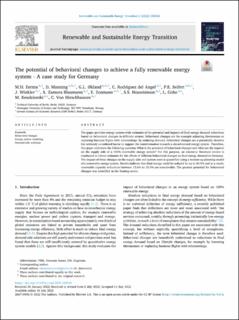| dc.contributor.author | Eerma, Mirjam Helena | |
| dc.contributor.author | Manning, Dylan | |
| dc.contributor.author | Økland, Gro Lill | |
| dc.contributor.author | Rodgriguez del Angel, Citlali | |
| dc.contributor.author | Seifert, Paul | |
| dc.contributor.author | Winkler, Johanna | |
| dc.contributor.author | Zamora Blaumann, Alfredo | |
| dc.contributor.author | Zozmann, Elmar | |
| dc.contributor.author | Hosseinioun, Seyedsaeed | |
| dc.contributor.author | Göke, Leonard | |
| dc.contributor.author | Kendziorski, Mario | |
| dc.contributor.author | von Hirschhausen, Christian | |
| dc.date.accessioned | 2023-02-22T10:25:50Z | |
| dc.date.available | 2023-02-22T10:25:50Z | |
| dc.date.created | 2022-08-18T22:59:31Z | |
| dc.date.issued | 2022 | |
| dc.identifier.uri | https://hdl.handle.net/11250/3053144 | |
| dc.description.abstract | The paper provides energy system-wide estimates of the potential and impacts of final energy demand reductions based on behavioral changes in different sectors. Behavioral changes are for example adjusting thermostats or replacing business flights with telemeetings. By reducing demand, behavioral changes are a potentially decisive but seldomly considered factor to support the transformation towards a decarbonized energy system. Therefore, this paper addresses the following question: What is the potential of behavioral changes and what are the impacts on the supply side of a 100% renewable energy system? For this purpose, an extensive literature review is conducted to obtain estimates for the effects of different behavioral changes on final energy demand in Germany. The impact of these changes on the supply side and system costs is quantified using a bottom-up planning model of a renewable energy system. Results indicate that final energy could be reduced by up to 20.5% and as a result, renewable capacity reductions between 13.6% to 30.6% are conceivable. The greatest potential for behavioral changes was identified in the heating sector. | en_US |
| dc.language.iso | eng | en_US |
| dc.publisher | Elsevier | en_US |
| dc.rights | Navngivelse 4.0 Internasjonal | * |
| dc.rights.uri | http://creativecommons.org/licenses/by/4.0/deed.no | * |
| dc.subject | Modellering av energisytemer | en_US |
| dc.subject | Energy system modeling | en_US |
| dc.title | The potential of behavioral changes to achieve a fully renewable energy system - A case study for Germany | en_US |
| dc.title.alternative | The potential of behavioral changes to achieve a fully renewable energy system - A case study for Germany | en_US |
| dc.type | Peer reviewed | en_US |
| dc.type | Journal article | en_US |
| dc.description.version | publishedVersion | en_US |
| dc.source.journal | Renewable and Sustainable Energy Transition | en_US |
| dc.identifier.doi | 10.1016/j.rset.2022.100028 | |
| dc.identifier.cristin | 2044362 | |
| cristin.ispublished | true | |
| cristin.fulltext | original | |
| cristin.qualitycode | 1 | |

